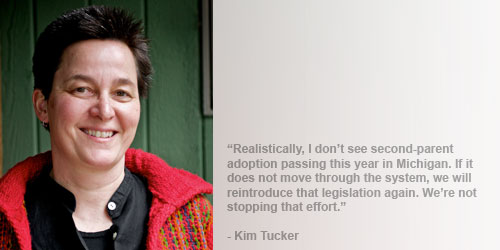by Jessica Carreras

Ann Arbor – Kim Tucker misses her old home of the San Francisco suburb of Oakland sometimes. The scenery, the weather – "by the time February gets here," she jokes – and, most importantly, living in a state that would give her and her partner, Lisa, the opportunity to both be recognized as parents of their daughter.
After occupational changes took Tucker and her family – including Taylor, age 10 – to Ann Arbor, where they now reside, they have made a home for themselves in Michigan, albeit in a state with no legal recognition of unmarried parents. But Tucker aims to change that.
Recently, the manager at Jane Bassett & Associates Law Firm took the helm of the Coalition for Adoption Rights Equality, a group of LGBT and allied parents fighting for adoption rights equality in the state. And Tucker has big plans: more visibility, coalition building and the legalization of second-parent adoption in Michigan.
Tucker got involved with CARE when, after moving back to Michigan (where she and her partner both grew up), she realized there were no legal venues to protect their family unit. "We traveled to China and adopted (Taylor) and had started second-parent adoption in San Francisco … and while we were in that process – we were just at the very beginning of it – some work situations changed and we relocated," she explains. "So we got involved with CARE a couple years after we were here just because there was no second-parent adoption in Michigan and it was an organization that was focusing on that effort."
After seven years in the state, nothing has changed. Tucker is Taylor's "legal" parent, and the moms still face obstacles, mostly at their daughter's school. "There's always the concern and struggles at school as far as being truly recognized and listed as parents in the directory," Tucker says. "That's been something that we've had to pay extra special attention to. One of us gets dropped off on a regular basis."
It's a familiar struggle to LGBT parents in Michigan. Tucker and her family have been lucky, she says, to have not dealt with other legal problems, and to have supportive families. "We are fortunate to have very supportive parents and the rest of our family," she says. "We've always been seen as Taylor's parents within our own family. But legally, of course, like many others here, we're not seen that way."
Second-parent adoption legislation would allow two unmarried parents to co-adopt a child or children, giving both of them legal stake in the child's upbringing, care and future. The bill, if passed, would ensure that both parents have the right to see and raise their child, and would override custody problems in cases where a couple splits up, or where the "legal" parent passes away. Presumably, it would also make it easier for gay and lesbian couples to adopt, lessening the burden on the state and taxpayers to support these children.
But the bill has been stuck in the legislative process for years. Though there have been several second-parent adoptions condoned by Michigan district courts, there is no law in place mandating that a court must do so. In April 2009, the bill passed out of the House Judiciary Committee on an 8-6 vote, but has since not made it to the House floor for a full vote. Tucker admits that with midterm elections fast approaching, the efforts of activists and supportive politicians are focused elsewhere. Second-parent adoption legislation, she says, is not likely to be passed this year. But CARE isn't giving up.
"Realistically, I don't see it passing this year," Tucker says. "If it does not move through the system, we will reintroduce that legislation again. We're not stopping that effort."
And, she adds, recent talks among LGBT and allied leaders at a focus group held by the Triangle Foundation/Michigan Equality merged organization made her hopeful that coalition building could help to get second-parent adoption passed – as well as anti-bullying legislation, the amendment to Michigan hate crimes law and an employment non-discrimination bill.
The key, Tucker says, is supporting each other. "I would hope that we would be able to partner up," she says. "If the new organization – whatever the name is going to be – if there is going to be a focus on public education, I would think that CARE would be partnering with that organization and seen as an expert in the particular area of adoption rights equality.
"I hope that would extend beyond just that organization but to a mindset so that we're all working together toward the same goals."
On CARE's part, Tucker says the group is holding a retreat later this month to talk about their image, their objectives and how they can work with the merged organization, as well as other groups, to help win battles in Lansing and in the hearts of Michiganders.
So for those who have been wondering where CARE has gone, don't worry, Tucker says. They're not going anywhere. "We need to regroup right now," she says. "We're going to be developing a strategy around where we go with the bill. We'll be looking at the elections that are coming up and the political landscape – the timing of it all.
"Second-parent adoption and CARE's focus on it is alive and well."










